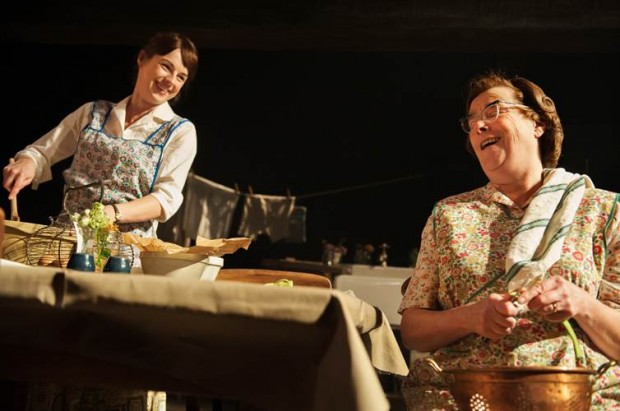You have no items in your cart. Want to get some nice things?
Go shopping
Arnold Wesker’s Roots may be set in 1958 – a time of post-war upheaval – but in all it says about class tensions, families and possibly East Anglia (I say this as a Suffolk girl), it continues to ring true today. Fantastically well written, superbly cast and beautifully produced, this is the best thing I have seen at the Donmar – or indeed elsewhere – in recent months.
Beatie (Beatrice) is a young woman living in London with her fiancé Ronnie, a passionate socialist and the protagonist of Wesker’s previous play, Chicken Soup with Barley, which itself had a well-received revival at the Royal Court in 2011. When she returns home to her family of Norfolk farmers for a holiday, she cannot help but find their world small and mundane and tries desperately to enlighten them to all that she has learned. Ronnie will be visiting for the first time in a fortnight and Beatie beseeches her family not to let her down. However, for all her attempts to introduce them to the joys of classical music and abstract art, they remain resistant. It soon becomes clear, when Beatie’s father has his hours reduced by the farm manager – while many of his co-workers are being laid off – that they have more serious things to worry about. As it turns out in the final act, when Beatie receives a consequential letter, Beatie is no more outward-looking than her parents or sisters. She may repeat Ronnie’s speeches about always being curious and asking questions, but she admits that she has never understood what he means. The apple never falls far from the tree, her parents say; and this is surely the reason why children reproach their parents for the shortcomings that they share, though they may not care to admit it.
Although the subject may sound sombre, this is in fact a hugely entertaining play, helped by brilliant acting all round. Little happens, every act being staged around the kitchen table, but Wesker has a lightness of touch that makes this drama a complete delight. Linda Bassett, as Beatie’s mother, is able to amuse even as she peels potatoes, and must recall many a parent as she sits with her lips pursed, listening to her daughter’s record player. Jessica Raine plays Beatie with a childlike energy, pirouetting with joy to the same piece of music and climbing on chairs to repeat her fiancé’s socialist ideas. I found myself particularly intrigued by the fact that Beatie was based on Wesker’s own wife and Ronnie modelled on the playwright himself. Not only is Beatie like every young person – questioning, even rebelling against, her roots – but she is also an individual, whose warmth and spark cannot fail to shine through.
Perhaps the most impressive part of the production was the staging, meticulously designed by Hildegard Bechtler. It’s not often that you see a pot of water being boiled onstage, or a tin bath being filled and emptied (I’m still wondering where all the water went). The same dedication to detail is evident in the scene changes, where furniture and props are cleverly used to create two different kitchens and then a more formal dining room, and even the floor surface changes from linoleum to carpet to reflect where we are.
Some may have found the play slow in its representation of rural rhythms , but the production is in good hands. Artistic director Josie Rourke seems to have a fondness for pastoral settings: two of the set-piece productions in her time at the Donmar were The Recruiting Officer, set in rural Shrewsbury, and The Weir, set in a rural Irish pub. The gentler rhythms of rural life present a challenge on screen, let alone on the stage, but thanks to Rourke and director James Macdonald – who himself hauntingly evoked a rural sense of place in the Royal Court’s 1997 production of Tom Murphy’s Bailegangaire – this production makes the family’s existence utterly captivating.
I left thinking that, for once, I had been truly absorbed in the scene before me and even forgotten briefly that I was in the city. The play culminates in a rousing ideological speech by Beatie about the inertia of the masses, which Raine manages to keep plausible. Compared to works by Wesker’s contemporaries with a similar political strain, such as John Osborne’s Look Back in Anger, Roots remains relatively light-hearted and ends on an optimistic note as Beatie finds her own voice.
When the play was last staged at the Royal Court in 2008, Wesker wrote an article in The Guardian expressing his disappointment at how many people had seen it simply as a “kitchen sink drama”, without really understanding that this is a “lyrical work about self-discovery”. His hope then was that over time these labels would fade and that the plays – timeless in the themes that they explore – would live on. As this excellent revival suggests, they will undoubtedly do just that.
Roots is on at the Donmar Warehouse until 30 November 2013. See the theatre website for more information

About Charlotte Seymour
Charlotte recently graduated from Oxford with a degree in French and Italian. A would-be nomad but for her cats and books which travel less easily, she is often on the move, and spent her year abroad between New York, Paris, Italy, and Madagascar, during which time she befriended some lemurs and learned to make limoncello. She will probably have to stay put now in London for some time…unless she runs away again. In the meantime, she can also be found writing for The Harker, and recently started an online guide to life (aka eating) in many corners of the globe.




